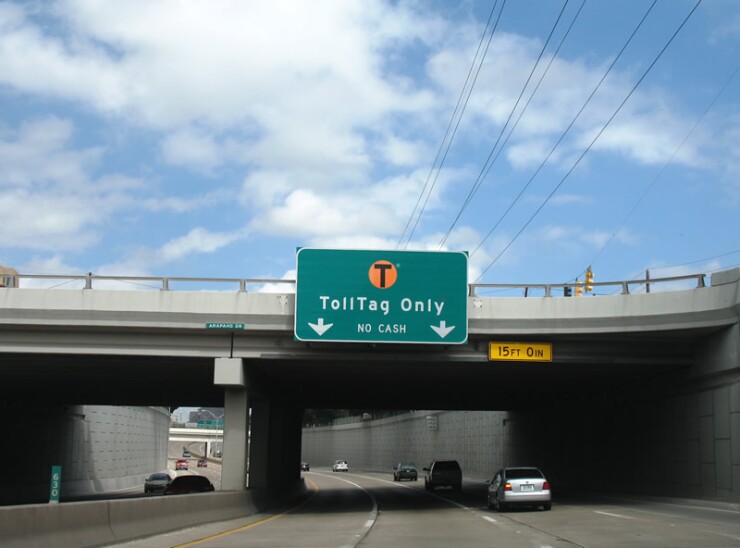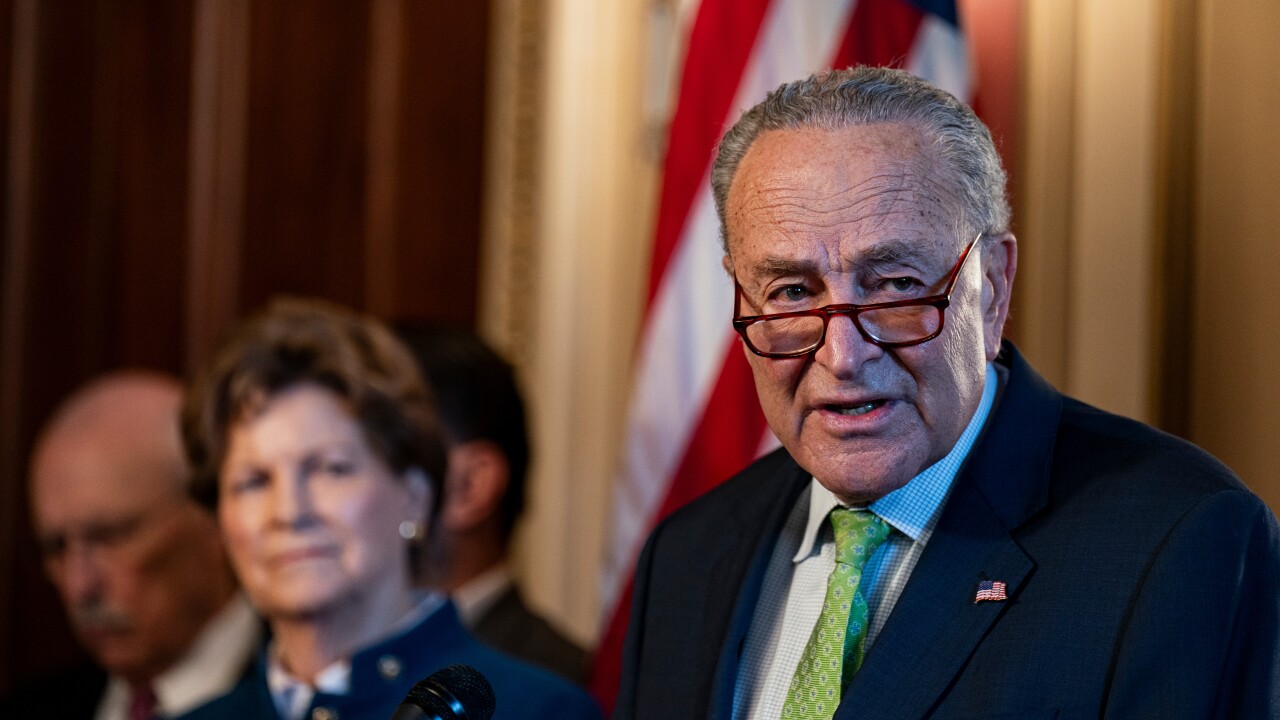After restructuring $6 billion of debt over the last six years, the North Texas Tollway Authority is entering a new phase of self-sustaining operations.
“We don’t anticipate issuing any bonds for new money,” said Horatio Porter, NTTA’s chief financial officer who has overseen a dramatic fiscal transformation of the state agency since 2013.

With 995 lane-miles of tollway expected to produce $886 million of revenues this year, NTTA will rely on a $488 million cash balance and $1.1 billion of cash flow for its $1.6 billion capital plan over five years, Porter said.
In the meantime, NTTA will continue to take advantage of refunding opportunities for savings this year, Porter said.
On July 16, NTTA expects to price $679 million of tax-exempt, non-AMT refunding bonds through negotiation with Barclays and its co-managers.
This month’s deal and another expected later this year will bring NTTA’s refunding over six years to $7 billion, Porter said. The authority has about $9 billion outstanding, he said.
After this year's issues, NTTA will have no variable-rate debt.
“Our refundings so far have delivered over $1 billion in net present value savings,” Porter said. “When we started, everyone kept saying rates are going to go up, rates are going to go up. Here in 2019, it still makes economic sense to refund our outstanding bonds.”
Indeed, supply of muni bonds in the absence of advance refundings has fallen far short of demand as investors have grown increasingly fond of toll debt, Porter said.
“We’ve heard that the demand is pretty strong because of limited supply,” he said. “And investors are increasingly recognizing that tolls are appropriate funding tools for critical infrastructure, particularly in well established urban areas.”
Reflecting NTTA’s transition to a more mature system, Moody’s Investors Service added a positive outlook to its A1 rating on $448 million of first-tier Series A bonds and A2 on $230.2 million of second-tier Series B.
Moody’s also upgraded NTTA’s subordinate lien bonds to Baa1 from Baa2 based on expectations of greater annual cashflow to the capital improvement fund.
“The positive outlook reflects our view that the authority will continue to see strong year-over-year traffic growth in fiscal 2019 and beyond supporting higher debt service coverage ratios and a more rapid reduction in leverage than traffic engineer’s forecast suggests,” Moody’s analyst Earl Heffintrayer noted.
“And NTTA will avoid additional debt over the next five years as planned capital investments will be made from annual surplus revenue and balances available in the capital improvement fund.”
S&P Global Ratings affirmed its A-plus rating and stable outlook on NTTA's first-tier toll road revenue bonds and its rating of A on the authority's second-tier revenue bonds.
“The ratings reflect the combination of the authority's very strong enterprise risk profile and strong financial risk profile,” analyst Kevin Archer wrote.
NTTA’s traffic grew 1.8% in fiscal year 2019, while toll revenue increased 4.8% due to the increase in overall transactions, Moody’s said.

Also working in the agency’s favor is the fact that most facilities were completed within the last 20 years and assets are in good condition. Construction risk for system expansions is minimal, according to Moody’s, and should not impact traffic significantly for the projects that have been announced.
Even some of the newest projects have proven so successful that they will be expanded, Porter said, citing the Sam Rayburn Tollway in the northern suburbs of Dallas and the President George Bush Turnpike Extension west of Dallas.
A $200 million project will add a fourth lane in both directions of the SRT from Lewisville to McKinney with completion expected in 2021. The PGBT that links Dallas’ northeast suburbs with those in the southwest is also undergoing widening.
NTTA’s tolling policy establishes a set 2.75% annual rate increase every two years, including one this month.
The NTTA system's primary arteries, the Dallas North Tollway, President George Bush Tollway, and Sam Rayburn Tollway serve the fastest growing areas of the Dallas-Fort Worth area, representing 75% of total revenue throughout the traffic consultant's forecast.
Frisco, the second fastest growing city in the U.S., per the census bureau, has seen a 247% population increase in the 10 years leading up to 2010. Since 2010, the population has continued to grow an additional 60.6%.
McKinney, linked to the NTTA network via the Sam Rayburn Tollway, ranks as the nation’s third fastest growing city with 4.45% population growth expected in 2019, according to the census bureau.
Debt for the Rayburn Tollway – about $3.2 billion – came to market in the tumultuous years of 2008 and 2009. Lehman Brothers, one of NTTA’s counterparties, collapsed amid doubts about whether NTTA could handle a doubling of its existing debt load.
The centerpiece of NTTA’s debt restructuring came in 2017 with a $2.5 billion refunding that allowed the authority to merge its Special Project System created in 2011 with its main system bonds.
The Special Project System was designed to protect NTTA’s main system bonds from a potential rating downgrade

To make the SPS projects viable, NTTA was granted a new form of insurance from the Texas Department of Transportation called a “toll equity loan agreement” or TELA that earned double-A ratings for the bonds. The TELA, originally set to expire in 2022 closed five years early with the 2017 refunding.
Proceeds of the upcoming bonds will refund all or a portion of the NTTA’s first-tier variable-rate revenue bonds issued in 2005, 2009, and 2014, along with second-tier revenue bonds from 2010.
Co-financial advisors on the deal are Hilltop Securities, Estrada Hinojosa & Co., and RSI Group.
John Daniel, managing director at Barclays, is lead banker.
McCall Parkhurst & Horton is co-bond counsel with Mahomes Bolden.
NTTA’s board leadership changed in May when Kenneth Barr stepped down as chairman after his election to the board of the Tarrant County College. NTTA bylaws prevent board members from also serving as elected officials.
Barr served on the NTTA board of directors as a Tarrant County representative for more than a decade and served as chairman since September 2011. During Barr’s tenure, NTTA entered Fort Worth’s Tarrant County for the first time, building the Chisholm Trail Parkway.
Denton County Representative John Mahalik was elected chairman to complete Barr’s term, which ends in August.
On the technology front, NTTA is preparing an $80 million upgrade of its toll-tag system, Porter said. The authority is also testing a smartphone app for paying tolls.
In terms of revenues, NTTA ranked as ninth largest toll system in the U.S. in a 2015 federal transportation study.





